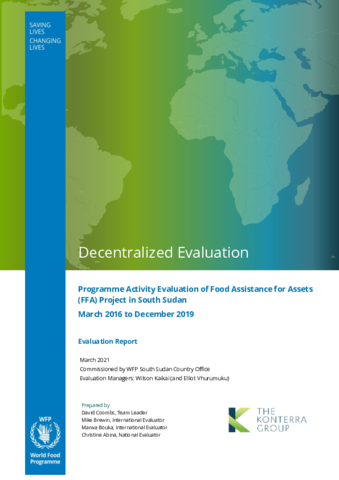
This decentralized evaluation was commissioned by the WFP South Sudan Country Office and covered the Food Assistance for Assets project, 2016-2019.
This project ran from early 2016 to the end of 2019 with up to 588,192 annual beneficiaries. Using transfers of food (36,659 mt) and cash (US$22 million), the project aimed to strengthen resilience to shocks and stressors through the restoration of productive capacity of arable land, improvements to community infrastructure, natural resource management and climate change adaptation activities, and capacity building and skills development.
The evaluation is to inform the implementation of the FFA programme in the next Country Strategic Plan cycle, 2023-2027; it serves the dual and mutually reinforcing objectives of accountability and learning.
Key recommendations from the evaluation are :
- Recommendation 1: The Country Office (CO) should identify the reasons why some Asset Management Committees are unable to ensure that infrastructure is properly maintained and follow up with appropriate remedial action.
- Recommendation 2: The CO should consult with the Government over support for the purchase of equipment necessary to undertake proper maintenance work on roads and dykes. The ET recognizes this carries significant initial purchase costs and would require a long-term operation and maintenance plan.
- Recommendation 3: The CO should continue to look for improvements to support gender transformative changes. Gender analysis has identified many elements of the project that supported female community members. Female change agents should be identified and empowered, and the recommendations of a recent rapid gender assessment should be implemented.
- Recommendation 4: The CO should consider piloting the introduction of small-scale irrigation systems, adapted to local hydrological conditions at selected FFA project locations, to help improve yields and reduce the labour needed for watering, especially for women.
- Recommendation 5: The CO should promote the production of tools together with FAO’s activities promoting seed production within South Sudan. The quality and availability of tools and seeds provided by the project was too often sub-standard.
- Recommendation 6: The CO should promote fish farming more widely, in conjunction with partners and the Government. Fish farming has been a considerable success where implemented, but has not been replicated to non-FFA areas.
- Recommendation 7: The CO should explore the use of mobile money, seek more competitive operators/agents for cash distribution, and increase SCOPE enrolment as widely as possible as it improves people’s access to credit.
- Recommendation 8: The CO should consider introducing an ‘exit package’ of training, equipment or materials when beneficiaries leave the project, to support their future livelihoods.
- Recommendation 9: The CO should consider introducing flexibility (between two to four years) into the period of enrolment in the project to allow for regional differences in vulnerabilities and opportunities for beneficiaries to become more self-supporting.
